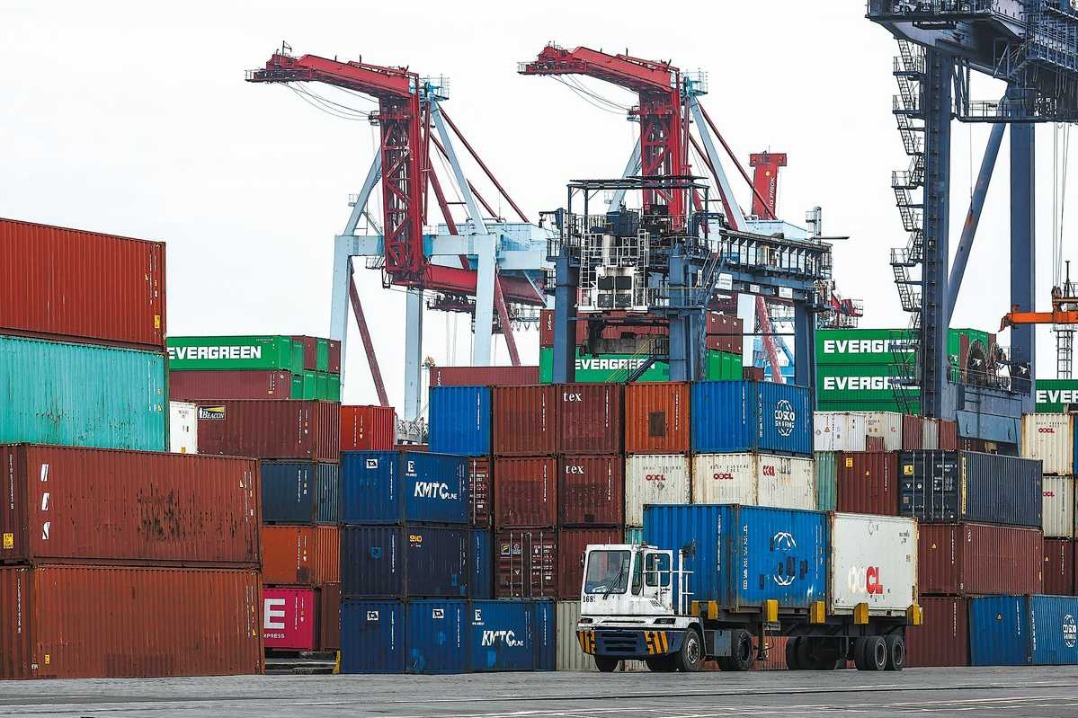E-trade — still 'thousands of miles' to travel

Global air delivery titan FedEx sees the Asia Pacific as the global center of e-commerce trade. Regional president Karen Reddington tells Edith Lu the group aims to give enterprises a competitive edge with shorter transit time for their goods.
Sitting in a region spearheading a solid recovery in the air-cargo market, driven by a healthcare services boom and robust international e-commerce, express delivery giant FedEx Express is staying the course as it continues to lift capacity to keep up with growing demand.
The United States-based airfreight carrier, which already operates two regional hubs on the Chinese mainland, sees "thousands of miles" in global e-commerce and giving its strengths full play in "sewing up" a worldwide infrastructure link.
"The Asia Pacific is one of the world's fastest-growing regions. We're seeing rising demand for air-cargo transport, partially boosted by the growth in healthcare services and products," says Karen Reddington, president of FedEx Express Asia Pacific — a subsidiary of the New York-listed FedEx Corp.
She keeps an eye on the industry as healthcare logistics plays an increasingly prominent role in the booming market, especially on the Chinese mainland.
According to healthcare information company IQVIA, the Chinese mainland took its place as the world's second-largest pharmaceutical market last year, worth $122.6 billion. It's also the biggest emerging market for pharmaceuticals with growth tipped to reach $175 billion by 2022.
Responding to the market changes, the purple-tailed fleet of FedEx has invested heavily in the healthcare portfolio of solutions.
Corresponding services, specifically for the Asia Pacific, include specialized packaging, temperature-controlled shipping, as well as advanced monitoring and visibility solutions. The company's SenseAware service could record and monitor a shipment's temperature, location, light exposure, humidity, shock and barometric pressure with multiple sensors.
FedEx's international express and cargo hub, located at Shanghai's Pudong International Airport, opened early this year as the second global hub on the mainland. It features a cold chain center to support healthcare logistics. Equipped with temperature-controlled storage ranging from -22 to 25 degrees Celsius, the facility offers a full suite of cold chain logistics solutions tailored to different healthcare products.
These healthcare products also need to be delivered by dedicated freighters that could provide cold chain solutions, such as Boeing 767 and 777 aircrafts, says Reddington.
The express delivery titan ordered 12 of Boeing's medium-sized 767 cargo aircrafts and 12 larger 777 airfreighters in June, worth $6.6 billion, making FedEx the biggest customer for both aircraft models. The purchase showed the company has placed its confidence in the wings of the Boeing 767 and 777, as well as the future air-cargo market.
"These aircrafts will be used globally," says Reddington. "We continue to invest in ever more efficient freighters after seeing efficiency having improved about 30 percent with the introduction of the 767 and 777 freighters."
Online market boom
The Boeing 777 aircraft, the world's biggest twinjet, is particularly suitable for intercontinental deliveries. As the company is focusing on connecting Asia with the US and Asia with Europe, she believes the 777 freighters will play a major role as these routes keep growing.
Besides healthcare logistics, the industry is counting on e-commerce continuing to soar, as well with more people buying products online for quick delivery. According to New York-based research firm eMarketer, global online purchases reached $2.304 trillion last year — a 24.8-percent surge over the previous year.
The growth was largely driven by the Asia Pacific, where 14.6 percent of overall retail expenditure went to e-commerce.
Compared with the Chinese mainland's local express delivery companies, the rate of FedEx's mainland domestic delivery services is higher on average.
Reddington explains they put greater emphasis on international business-to-business customers primarily, as they also demand mainland domestic delivery services. For these customers, large sorting facilities and connectivity with these facilities are more critical than rates.
"People often talk about the first mile and the last mile in e-commerce. But, when you're talking about international cross-border e-commerce, there're thousands of miles. What they need is a globally connected infrastructure," Reddington says. "And that's where FedEx really has a lot of strengths."
At present, FedEx operates about 260 flights weekly on the mainland through four key airports — Beijing Capital International Airport, Shanghai Pudong International Airport, Shenzhen Bao'an International Airport and Guangzhou Baiyun International Airport.
The group recently launched two new routes — one linking its regional hub in Guangzhou with its world center in Memphis, and another connecting Guangzhou and Vietnam's capital Hanoi. The former uses a Boeing 777 freighter.
Reddington expects these routes to benefit importers and exporters around the world for their Asia-Pacific operations, as they could obtain a stronger competitive advantage with less transit time.
Shipments within Asia are expected to be delivered in one business day, while those from Europe and North America would arrive in no more than three business days.
Most positive growth
The international air transportation industry showed the most positive growth last year in recent years. Airfreight demand — measured in freight ton kilometers — more than doubled to 9 percent, according to the International Air Transport Association (IATA).
The association was upbeat about the outlook at the beginning of this year. However, the rapid growth seen in 2017 is now over, with demand growing at a significantly slower pace this year.
Global freight capacity, measured in available freight ton kilometers, grew by 6.2 percent year-on-year in May, while airfreight demand saw an increase of 4.2 percent. It was the fourth consecutive month that capacity growth had surpassed growth in demand.
IATA considered rising trade tensions as one of the main reasons. "Headwinds are strengthening with growing friction among governments in trade. We still expect demand to grow, but those expectations are dampened with each new tariff introduced. Experience tells us that trade wars, in the long run, only produce losers," said Alexandre de Juniac, IATA's director-general and chief executive.
Reddington is unwilling to speculate on the impact brought by the Sino-US trade standoff as FedEx is looking at the long term. But, she deems traders the lifeblood of global growth and that's why they keep investing in infrastructure and in markets like Vietnam.
"For FedEx, trade is really our business," she says.
Contact the writer at edithlu@chinadailyhk.com.
































